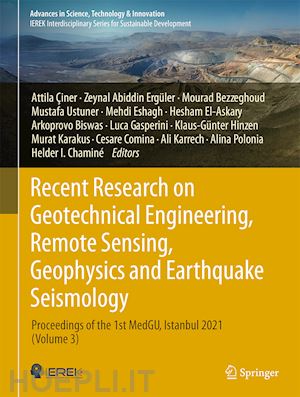
Questo prodotto usufruisce delle SPEDIZIONI GRATIS
selezionando l'opzione Corriere Veloce in fase di ordine.
Pagabile anche con Carta della cultura giovani e del merito, 18App Bonus Cultura e Carta del Docente
This edited book is based on the accepted papers for presentation at the 1st MedGU Annual Meeting, Istanbul, 2021. With five parts spanning a large spectrum of geological, geotechnical, and geophysical topics, this book presents a series of newest research studies that are nowadays relevant to Middle East, Mediterranean region, and Africa.
The book includes the latest research studies on seismic hazard and risk assessment, earthquake geodesy, seismotectonics, archaeoseismology and active faulting, well logging methods, geodesy and exploration/theoretical geophysics, geological engineering, geotechnical engineering and geoenvironment, geo-informatics, remote sensing and geohazards, basement architecture and potential data, and numerical and analytical methods in mining sciences and geomechanics.
Section 1. Geological Engineering, Geotechnical Engineering and Geoenvironment.- Section 2. Geo-Informatics, Remote Sensing and Geohazards.- Section 3. Applied & Theoretical Geophysics.- Section 4. Earthquake Seismology and Geodesy.- Section 5. Numerical and Analytical Methods in Mining Sciences and Geomechanics.
Attila Ciner:
Attila Çiner is a sedimentology and Quaternary geology professor at the Eurasia Institute of Earth Sciences at Istanbul Technical University, Turkey. After graduating from the Middle East Technical University in Ankara (1985), he obtained his M.Sc. degree at the University of Toledo, USA (1988), and his Ph.D. at the University of Strasbourg, France (1992). He works on the tectono-sedimentary evolution of basins and Quaternary depositional systems such as moraines, fluvial terraces, alluvial fans, and deltas. He uses cosmogenic nuclides to date these deposits. He primarily focuses on the glacial deposits and landscapes and tries to understand palaeoclimatic and palaeoenvironmental changes since the Last Glacial Maximum. Lastly, he was part of the Turkish Antarctic Expedition. He spent two months working on the site recognition and decision of the future Turkish scientific research station to be implemented on the continent. He is the editor-in-chief of Mediterranean Geoscience Reviews and the chief editor of Arabian J. of Geosciences, both published by Springer. He has published more than 100 peers-reviewed articles and book chapters.
Zeynal Abiddin Ergüler:
Prof. Dr. Zeynal Abiddin Erguler is a full professor at the geological engineering department at Kutahya Dumlupinar University (Turkey). Dr. Erguler holds a B.Sc. (1998), an M.Sc. (2001), and a Ph.D. degree (2007) in Geological Engineering from Hacettepe University (Turkey). His research interests mainly focus on rock mechanics, engineering geology, environmental geology, and soil mechanics. His current investigation is to understand and model the thermo- hydro-mechanical behaviour of shale rocks in the area of shale gas production. In addition to performing many types of research and industry-funded projects, he has also taught and supervised undergraduate and graduate students. In 2017, Dr. Erguler joined the Arabian Journal of Geosciences (AJGS) as an editor responsible for evaluating submissions in the fields of rock mechanics, engineering geology, environmental geology, and soil mechanics.
Mourad Bezzeghoud:
Mourad Bezzeghoud is a full professor at the University of Évora (Physics Department/School of Sciences and Technology and a researcher at the ICT/IIIFA). He is, presently, the president of the Scientific Council of the School of Sciences and Technology and the coordinator of the Instituto de Ciências da Terra (ICT) (Univ. of Évora). He has published dozens of articles in specialized revues and journals and several books and chapters in book. He works in the area of Earth Sciences (Solid Earth Geophysics) with an emphasis in seismology. He interacted with more than 198 collaborators in co-authorship of scientific works. He has leading and participated in several international and national research projects and co-organized a number of scientific conferences. He is, presently, an associated editor in Frontiers-Solid Earth Geophysics and the committee member of the Mediterranean Geosciences Union. In his curriculum, Ciência Vitae (https://www.cienciavitae.pt//9715-98D9-D5BB), the most frequent terms in the context of scientific and technological production are: earthquake seismology, seismic source, historical and instrumental seismicity, focal mechanisms, seismic risks, seismotectonics, nonlinear dynamics, seismic network, Ibero-Maghrebian region, and Muography as a new tool for Geophysics.
Mustafa Ustuner:
He received his Ph.D. in Geomatic Engineering from Yildiz Technical University from Türkiye. He was a short-term visiting researcher in the Geo-Spatial Analytics Lab at the University of South Florida in the USA and was a visiting researcher in the Department of Earth Observation at the Friedrich-Schiller-University of Jena in Germany. Currently, He is working as an assistant professor in the Department of Geomatic Engineering at Artvin Coruh University, Turkey. As an editorial task, he has been serving as an associate editor for the European Journal of Remote Sensing and Arabian Journal of Geosciences. He received the award for Top Reviewers for Geosciences-September 2018 from Publons.
Mehdi Eshagh:
Mehdi Eshagh is a professor of Geodesy in the department of engineering science at University West, Trollhättan, Sweden. He is interested to work on all geodetic subjects, but Satellite Gravimetry and its applications in the Solid Earth Geophysics are his main field of interest. He uses mathematics and statistics in his research regularly and tries to use these tools to develop new methodologies to solve different geodetic and geophysical problems.
Hesham El-Askary:
Prof. El-Askary received his Ph.D. in Computational Sciences and Informatics from George Mason University in 2004 along with his two M.S. degrees in Computational sciences and Earth Systems Sciences. In 2015, he earned Chapman University's elite Seni











Il sito utilizza cookie ed altri strumenti di tracciamento che raccolgono informazioni dal dispositivo dell’utente. Oltre ai cookie tecnici ed analitici aggregati, strettamente necessari per il funzionamento di questo sito web, previo consenso dell’utente possono essere installati cookie di profilazione e marketing e cookie dei social media. Cliccando su “Accetto tutti i cookie” saranno attivate tutte le categorie di cookie. Per accettare solo deterninate categorie di cookie, cliccare invece su “Impostazioni cookie”. Chiudendo il banner o continuando a navigare saranno installati solo cookie tecnici. Per maggiori dettagli, consultare la Cookie Policy.